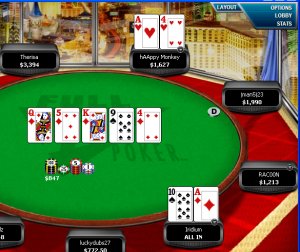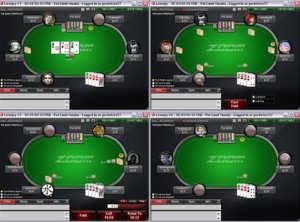Full Tilt Legal Counsel: "Deal is a Great Outcome for Stakeholders"

 It’s been a wild last 10 days for members of the online poker community. PokerStars, the largest site in the land, purchased the assets of its one-time chief rival, Full Tilt Poker. The legal firm Cozen O’Connor represented Full Tilt Poker in the deal, which was consummated on Thursday with the receipt of $225 million sent from Stars to the U.S. Government.
It’s been a wild last 10 days for members of the online poker community. PokerStars, the largest site in the land, purchased the assets of its one-time chief rival, Full Tilt Poker. The legal firm Cozen O’Connor represented Full Tilt Poker in the deal, which was consummated on Thursday with the receipt of $225 million sent from Stars to the U.S. Government.
Anne Madonia, the Cozen and O’Connor attorney who led the corporate team that closed the deal on behalf of Full Tilt Poker, sat down with PocketFives to talk about the U.S. repayment process, the involvement of Ray Bitar and Howard Lederer, and the value of the Full Tilt Poker brand.
PocketFives: Thanks for joining us. Can you give us your view of the Full Tilt asset sale to PokerStars?
Anne Madonia: After working on multiple potential deals over the last 15 months, it’s a great outcome for all of the stakeholders involved, so we’re happy to have helped Full Tilt to this point.
PocketFives: Why is it necessary to have U.S. players go through the Department of Justice to be repaid rather than PokerStars itself? Was handling this a different way discussed?
Anne Madonia: My understanding is that we were required as part of the settlement that U.S. players would go through the DOJ remission fund. We didn’t have a lot of leverage in negotiating and the U.S. Government mandated that. In thinking back over the last 15 months, there might have been some discussion to pay players in the U.S. directly through the potential buyer, but as the months passed, the DOJ became much more adamant about it going through them instead.
PocketFives: Are there any updates on the process for U.S. Full Tilt player cashouts? Forbes reported that there was a possibility that players would only be refunded their deposits instead of their full account balances.
Anne Madonia: Nothing has changed on that front. We still no information in that regard.
 PocketFives: Can you talk about a few of the reasons for the failed deal with Groupe Bernard Tapie, led by Laurent Tapie (pictured)? Would U.S. players have been treated differently in that proposed deal?
PocketFives: Can you talk about a few of the reasons for the failed deal with Groupe Bernard Tapie, led by Laurent Tapie (pictured)? Would U.S. players have been treated differently in that proposed deal?
Anne Madonia: There were many negotiations between the DOJ and Tapie that we were not privy to. Ultimately, the DOJ decided that they were not going to allow Tapie to purchase the assets after the forfeiture. The DOJ was concerned on a number of levels. Tapie being able to pay the rest of the world players was one of the key concerns for the Government and for Full Tilt. The #1 priority for us has been to get the best deal possible for all of the stakeholders involved.
PocketFives: What are the specific assets that PokerStars purchased?
Anne Madonia: They purchased all of the pertinent assets for the re-launch of Full Tilt. They purchased all of the operating assets.
PocketFives: How much were Howard Lederer and Ray Bitar involved in the deal?
Anne Madonia: Howard and Ray were very much involved in the negotiations with PokerStars and really wanted this deal to go forward.
PocketFives: If the deal with PokerStars were to have fallen through, what were the next steps?
Anne Madonia: There were different avenues that were available to Full Tilt. One would have been to continue to look for a buyer. There are so many operators and potential acquirers out there that were interested in these assets. Part of what we helped Full Tilt Poker and its owners and directors do is navigate the issues. Should they fight the civil forfeiture proceedings on the basis that online poker is not illegal in the United States? Should they liquidate? In the end, we negotiated a voluntary forfeiture with a buyer for the assets. Without a buyer, it would have been very different discussions with the DOJ.
 PocketFives: What was PokerStars’ motivation to make the deal happen?
PocketFives: What was PokerStars’ motivation to make the deal happen?
Anne Madonia: I can’t speak for PokerStars and I’m not privy to the legal or business reasons motivating PokerStars. If I had to guess, there are great synergies, so I’d imagine they took those into consideration. The assets that FTP had to offer, including Rush Poker, were assets they were obviously interested in. The player database is interesting as well.
PocketFives: Do you think there is value in the Full Tilt brand?
Anne Madonia: The future of Full Tilt Poker is in the hands of PokerStars. For the last 16 months, Full Tilt Poker’s directors and managers undertook enormous efforts in a very difficult situation to maintain the value of Full Tilt Poker and its assets, including the employees, to accomplish this asset transfer. The Full Tilt Poker brand continues to have value today because of these efforts.
PocketFives: When did negotiating with PokerStars begin?
Anne Madonia: At various times, Full Tilt was under exclusivity. They spoke with lots of potential buyers. For example, in September 2011, they engaged with an investment banker to outreach to 50 potential private equity funds and operators. They did a lot of outreach. We first began to discuss a deal with PokerStars at the end of April.
PocketFives: What happened to the old Full Tilt Poker owners?
Anne Madonia: Certain directors, who are also owners, are not permitted to participate in any way with the ongoing Full Tilt operations. The owners of Full Tilt Poker continue as owners of the companies, which obviously no longer own any assets relating to the operation of the Full Tilt Poker online poker room. As set forth in the settlement documents, none of the Board members of Tiltware LLC will work for the new Full Tilt Poker site.




